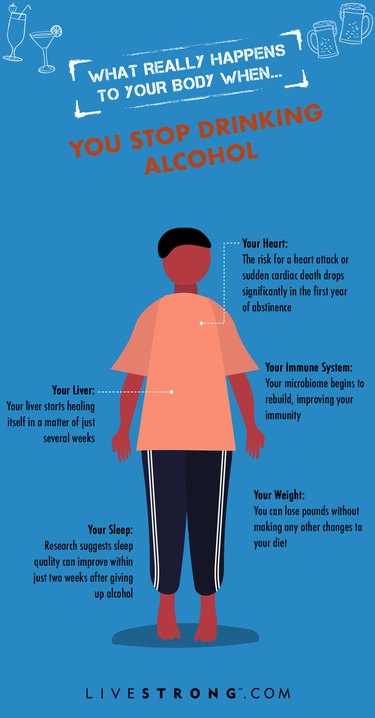
If you tend to overindulge in alcohol a bit more than you should, you might be doing more harm to your body than you think. Get this: Drinking too much — either overtime or in a single sitting — is tied to causing damage to your heart, liver, pancreas and immune system and can even increase your chances of developing certain types of cancer, according to the National Institutes of Health.
So, is all that damage reversed when you stop drinking? Not exactly, but you are on your way to better health by abstaining from all types of alcohol or by cutting back to the current recommendation of no more than one drink per day for women and two for men. (And remember, one drink is considered 12 ounces of beer, 5 ounces of wine or 1.5 ounces of spirits.)
Video of the Day
Video of the Day
"I felt better. I felt stronger in my workouts. My thoughts were clearer. I had a more positive outlook on life. My leggings fit a little better."
If you've committed to stop drinking alcohol, you'll likely notice some positive changes. Dietitian and certified personal trainer Regan Jones, RD of This Unmillennial Life podcast, gave up her nightly wine habit and said, "I felt better. I felt stronger in my workouts. My thoughts were clearer. I had a more positive outlook on life. My leggings fit a little better."
Here's what can happen to your body when you stop drinking alcohol.
Your Heart
Heart disease is the number one killer in the United States, with one person dying every 37 seconds, according to the Centers for Disease Control and Prevention. That's a pretty sobering statistic. What's even worse is that many of those deaths are completely preventable.
Chronic heavy drinking and even binge drinking can cause some heavy damage to your heart. So, if you're going out every weekend and overdoing it, your heart may be taking a hit.
Heavy and binge drinking can cause increased blood pressure (aka hypertension) and heart muscle disease (aka cardiomyopathy), which can lead to heart failure and death, according to December 2019 research published in the Journal of the American Heart Association.
That's the bad news. The good news is that, according to the American Addiction Centers, hypertension can be quickly reversed with treatment and diet; and in some cases, but not all, cardiomyopathy may also be reversed. For those who stop drinking, the risk for a heart attack or sudden cardiac death drops significantly in the first year of abstinence.
Your Liver
The liver is usually the organ that comes to mind when you hear about alcohol taking a toll on your body. That's because it's the detox organ for alcohol — it helps break down, or metabolize, the alcohol you drink.
The liver can't perform extraordinary feats of marvel, however, it can only metabolize roughly one standard drink each hour. Any more than that, especially on a regular basis, and you run the risk of damaging your liver.
Health experts indicate that pretty much everyone who drinks heavily on a regular basis develops simple fatty liver. If left untreated, that fatty liver can lead to fibrosis, cirrhosis or alcoholic hepatitis over a long period of time, according to a July 2017 article published in Gastroenterology & Hepatology.
There is good news here, too, though. If you've been diagnosed with simple fatty liver by your doctor and you abstain from alcohol, your liver can heal itself in a matter of just several weeks, per the Gastroenterology & Hepatology study, but this varies depending on the severity.
Your Immune System
If you think that throwing back a few extra rounds of shots on the weekend isn't going to negatively affect your immune system, health experts would disagree. According to a 2015 article published in Alcohol Research, immune system impairment is not only seen in people who drink large amounts of alcohol regularly but also in those who binge drink occasionally, too.
As for the effects of a weakened immune system? These include a higher risk for pneumonia and a reduced ability to fight off infections.
This is due partly to the disruption in your microbiome, in which alcohol may reduce your gut bacteria and alter the diversity. "Research suggests alcohol cessation may improve immunity," Lisa Andrews, RD of Sound Bites Nutrition, tells LIVESTRONG.com. "Alcohol changes the numbers of microbes in the microbiome and the structure and integrity of the gut are altered with alcohol intake."
When you quit drinking alcohol, you can start rebuilding your microbiome. There is no way to know how much time is needed to rebuild your gut — because each person's microbiome is unique — but eating a diet high in fiber (think fruits, vegetables, beans and whole grains) and probiotic foods (such as yogurt and kimchi) can help you on your way to getting your gut healthy.
Your Sleep Quality
Alcohol is a sedative, so if you're drinking right before you go to bed, you might be thinking that it is helping you sleep — and sleep is good for you, right? This is where the lines are blurred.
While you may not have any problems falling asleep after drinking a few glasses of wine, the quality of your sleep becomes majorly disrupted, according to November 2015 research published in the Korean Journal of Family Medicine. This means that even though you may be able to fall asleep, you may not be able to stay asleep.
However, research suggests that sleep quality can improve within just two weeks after giving up alcohol, according to an October 2014 article published in Family and Community Health. Of course, this may vary with each person, but finding other ways to help yourself fall asleep may just improve the quality of your sleep.
Your Weight
If imbibing one or two drinks every now and then slowly becomes a daily routine, expect the number on your scale to creep up as well. Drinking an extra drink or two can add 100 calories or more each evening, and over the course of a month, you could easily add a pound (or more) to your frame.
While a little weight fluctuation is not a big deal, it can add up over time. "Drinking less may also make weight loss and long-term weight control easier because alcoholic beverages have empty calories you don't need," Elizabeth Ward, RDN of Better is the New Perfect, tells us. Simply skipping on those extra 300 calories each night can help you drop pounds — without making any other changes to your diet.
So, if you're trying to crush some weight-loss goals, cutting out the alcohol may help you achieve them faster.
Your Nutrient Levels
Vitamin and mineral deficiencies are tough to spot in adults because the warning signs are often subtle and slow to develop.
Alcohol blocks the absorption of folate and low folate levels are associated with an increased risk for breast cancer, according to the Harvard T.H. Chan School of Public Health. In addition, alcohol can also interfere with the absorption of thiamine, an essential B vitamin necessary for energy metabolism, according to the Alcohol and Drug Foundation.
You may find that you don't make the best diet choices when you drink, so the quality of your diet may take a hit, too. Those who drink alcohol regularly can be "severely malnourished due to forgetting to eat when drinking alcohol," Ellyn Silverman Linnetz, RD, tells us. When you stop drinking alcohol, it can put you in control of your diet to choose healthy and nourishing foods.
Click below to pin these pointers and save them for later!

When to Seek Help
Quitting cold turkey may not be your best option if you find yourself drinking too much, too often and are showing signs of dependency.
"Alcohol dependency, when not treated appropriately, can result in fatal consequences, so it's better to have medical support in the process."
If you think you have a dependence on alcohol or if a trusted family member or friend has mentioned it to you, it's best to seek help from your doctor when you're ready to stop drinking. "Alcohol dependency, when not treated appropriately, can result in fatal consequences, so it's better to have medical support in the process," Komal Deepak, RDN, cautions.
Call the Substance Abuse and Mental Health Services Administration (SAMHSA) National Helpline at 1-800-662-HELP (4357) if you need to talk to someone about your drinking habits.
- National Institutes of Health: "Alcohol's Effect on the Body"
- CDC: "Heart Disease Facts"
- Journal of the American Heart Association: "Evidence for a Direct Harmful Effect of Alcohol on Myocardial Health: A Large Cross‐Sectional Study of Consumption Patterns and Cardiovascular Disease Risk Biomarkers From Northwest Russia, 2015 to 2017"
- American Addiction Centers: "How Long Does It Take to Reverse Alcohol Damage?"
- Gastroenterology & Hepatology: "Treatment of Alcoholic Liver Disease"
- Korean Journal of Family Medicine: "The Effects of Alcohol on Quality of Sleep"
- Family and Community Health: "The Prevalence of Sleep Disturbance in Alcoholics Admitted for Treatment"
- Harvard T.H. Chan School of Public Health: "Alcohol: Balancing Risks and Benefits"
- Alcohol and Drug Foundation: "Thiamine"
